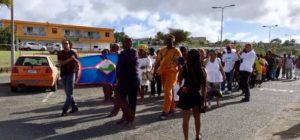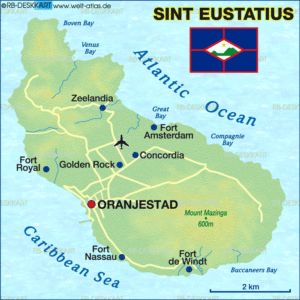An emergency move from the Dutch government on Feb. 6 to dissolve the local authority of its Caribbean island, St. Eustatius, is bringing new urgency to the Statian struggle for decolonization.
The power shuffle comes after a damning report from the national State Secretary accusing the administration of the island — which has special Dutch municipal status — of lawlessness, financial mismanagement, discrimination and intimidation. With parliamentary backing but no prior consultation with the local population, a government commission was deployed to replace the island’s council and college board.
“They don’t abide by Dutch laws, and as a result they fall outside Dutch law and order. No government can accept that,” Jan Fransen, one of the report’s authors, told Dutch public broadcaster NPO2. “They want to apply their own laws because they believe they have the right to govern the island themselves.”
The move was met with a silent protest march on the island, also known as Statia, over what activists see as a colonial power grab that undermines their sovereignty.
“The takeover wasn’t really a surprise,” said Glenn Schmidt, co-founder of the activist group Pro Statia which advocates for autonomy of the island. “The possibility of Dutch intervention in Statia was hanging over our heads for some time now because of the disturbed relationship between our local government and The Hague. But what was shocking is the extent of it — that they put the entire democratically-elected government aside.”
Tensions between the central government and Statian authority had been running high since last September when the military was restoring order on Dutch Caribbean islands wrecked by Hurricane Irma. Clyde van Putten, head of the Progressive Labor Party and coalition leader of the local council, had reportedly threatened then Dutch Interior Minister Ronald Plasterk, saying “If you bring the military with you, then we will kill them and we will burn them on the streets of Statia.”
But more than just a provocateur, Van Putten has also been a long-time vocal opponent of the island’s special municipal status, which it got in 2010 with the dissolution of the Dutch Antilles. Curacao and St. Martin joined Aruba as autonomous lands under the Dutch Kingdom while smaller islands Saba, Bonaire and St. Eustatius became special municipalities.
“The people of Statia never opted for this status,” said Xiomara Balentina, co-founder and leader of the Brighter Path Foundation, an activist group pushing for a popular referendum. “We have no direct representation in the Dutch Parliament, and get fewer social benefits. There is no equality, political or economic.”
Pro Statia and Brighter Path Foundation are the two grassroots organizations that since 2012 have become a political force in the fight for Statia’s autonomy. Through town hall meetings, seminars and rallies they have been educating and mobilizing the island of 3,400 inhabitants to “bring awareness to our people about our constitutional status and to encourage conversations about the type of constitutional relationship they envision for the future,” Balentina said.
In 2014 their organizing work succeeded in pressuring the local government to hold a popular referendum on the island’s constitutional status. Although 65 percent backed becoming autonomous within the kingdom, the total voter turnout was well below the threshold to be considered binding.
Autonomy within the Dutch Kingdom would mean Statians can take government and legislation into their own hands even as the Netherlands maintains financial oversight as well as control over the military and foreign affairs.
“We believe us Statians can and must grow to handle most of our own internal affairs,” Schmidt explained. “The attitude of the Dutch government seems to be more in the direction of we must sit quiet while they ‘do it for us.’ We reject this idea. We want to be rulers on our island and develop a community for our Caribbean people, not for Statia to become a European outpost for Europeans.”
The Statian struggle for autonomy continues a longer historic trail of denied democracy and freedom from Dutch rulers. A colonial possession that switched hands between Dutch and British empires since 1636, Statia was a central port in the transatlantic slave and arms trade. It was also known as the “golden rock” for its sugarcane and tobacco plantations, which were exploited with slave labor.
Slavery was officially abolished in 1863, but it wasn’t until 1948 — with the end of World War II and Indonesian independence — that men on the island could vote. Women couldn’t vote until 1963, more than 20 years after Dutch women in the mainland. The Dutch Colonial Council justified withholding democracy from their colonies by saying its people weren’t sufficiently “ripe” or “properly developed,” and so required “pure colonial governance.”
This colonial logic seems to persist today as Statians seek to achieve greater freedom. When Van Putten formally petitioned for autonomy with the central government in January last year, Prime Minister Rutte never responded.
Van Putten’s move to seek dialogue with the Dutch government had come directly from a strategic plan laid out by a constitutional committee that representatives from Pro Statia and the Brighter Path Foundation joined after 2014. The activists also released a white paper to present their case for autonomy, drafted a constitution for popular consultation, and lobbied with the U.N. for the island’s reenlistment as non-self-governing territory.
But for Francio Guadeloupe, a social anthropology professor at Amsterdam University and former president of the University of St. Martin, these are political tactics that seem to evade the more pressing issue of economic inequality gripping the island.
“These islands and the people living there did not choose to become Dutch, they are part of a tragedy called imperialism,” Guadeloupe explained. “We can all say this is wrong. But to reduce the situation to a political struggle between two administrations is forgetting the people feeling the brunt, working for, or below minimum wage. A referendum won’t immediately solve their concerns.”
St. Eustatius, like its neighboring Caribbean islands with special municipal status, face higher poverty rates than those on the Dutch mainland, despite being part of the same kingdom. Since the dissolution of the Antilles, the costs of living have risen dramatically while wages and welfare have stayed the same. When it comes to the rights of Dutch people in the Caribbean, the Netherlands applies a double standard, a 2016 report from the Dutch College of Human Rights concluded.
“Let’s start with that — solving their concerns — then we can think about creating a structure that is more equal,” Guadeloupe added. “If people live a decent life they are better able to choose what political administration they want, what political leaders they want to support. Asking them to do so when they can hardly survive is disingenuous.”
For activists on the ground, however, they say their priority is now set on continuing to protest Dutch interventionism and making sure their elections in 2019 go ahead as scheduled.
“People have an intrinsic need to be free. All people, at some point in their lives, want to govern themselves,” Balentina said. “The Netherlands at one point in its history was dominated by Spain, the Dutch fought for its independence. So why can’t we?”


